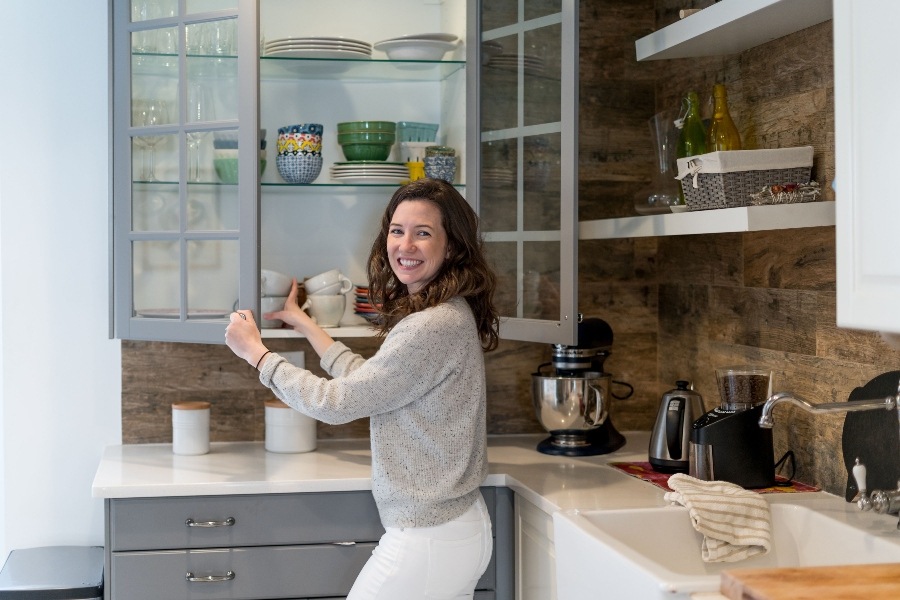This Philly Organization Expert Wants to Help You Conquer Your Spring To-Do List
Michelle Dillon, owner of Together Organizing, shares her tips on spring cleaning and living more efficiently.

Michelle Dillon, owner of Together Organizing, offers tips and tricks to making your house and your life feel more put together. / Photograph by Traci Elaine
For so many of us, life is dictated by deadlines. It seems like we’re juggling a million things at once: cranking out projects, working overtime, picking up the dogs or kids from daycare, cooking dinner, trying to maintain some semblance of a social life. In the Age of To-Dos, the hustle is real.
An overwhelming schedule doesn’t leave much time for all your niggling chores. It’s difficult to Marie Kondo our lives when we have more immediate and pressing demands, amirite? We bet those old clothes you’ve been wanting to give away are still in your closet, and your unorganized kitchen pantry is still in disarray. And let’s not even mention all that paperwork piling up on your coffee table.
To offset the guilt you might be feeling, Philly transplant Michelle Dillon is determined to help you check things off your personal to-do list and ease your mind. This past January, Dillon — a former fifth-grade teacher — founded Together Organizing, a home organizing business. In addition to revamping kitchens, offices, closets, and bathrooms, she also helps clients prepare for a big move and create weekly meal plans. As your personal accountability partner, Dillon works with you to declutter both your house and your headspace.
To help you spring into action this season, Dillon shared her advice on how to conquer your personal to-do list, one task at a time.
Organizing Your Kitchen
The most overwhelming part of the kitchen is the pantry. It’s easy to forget which foodstuffs you’ve already socked away, and before you know it, you’ve got five cans of kidney beans collecting dust. Tackle the hoard by taking everything out and seeing what and how much of the same thing you have. Then reflect on your eating habits, thinking about which food items you use most frequently. From there, put aside the items you actually need (make sure they’re still good to eat). For whatever’s left, look at the expiration dates. If they’re not expired, put them in a “to donate” box or bag. Trash the rest.
Meal Prepping
When you’re trying to figure out your meals for the week, start with your calendar. If you’re grabbing lunch or dinner once or multiple times throughout the week, then you don’t need to prep as many meals as you might have anticipated.
Once you know how many meals you’ll need to cook, decide what you want to eat that week — salads, tacos, pot roast — so you don’t spend extra on random items at the grocery store. Also, inventory your pantry (which, hopefully, you already organized!) and refrigerator to see what you’ve already bought and make a mental or on-paper list to avoid buying ingredients you already have.
Grocery Shopping
The number one rule of being efficient while grocery shopping is: Never. go. hungry. Eat a meal or a snack before you shop. This will help you stick to your pre-made grocery list as well as your budget.
Organizing Your Closet
Many of us have such a personal attachment to our wardrobe. Asking, “Have you worn it in the past year?” isn’t necessarily the solution, as it could cause us to overthink so much we end up even more stressed. Instead, set aside a designated donation bag and a sell bag and create a regular routine (once a month or once every three months) to send those bags off to their final destinations. That way, while going through your winter clothes, you can put certain items in either bag and think on it for a bit. If in a week, you’re desperate to keep that one knit sweater, then all you have to do is take it out of the bag and put it back in your closet. Chances are, though, you won’t miss whatever you put in those bags.
It’s also helpful to organize your closet with someone. Having an accountability partner to talk through what you want to keep versus what has been on a hanger for the past 10 years gets you to make productive, objective decisions.
Moving
The two most important pre-moving tips, Dillon says, are start early and start small. Packing only becomes overwhelming if you start a week before your move because then you’re scrambling from room to room, throwing clothes into the same bag as your tupperware. To avoid the stress, tackle one room at a time and label your boxes. That way, your movers can put the boxes in their appropriate rooms.
You should also be committed to having separate trash, donate, and sell piles as you’re packing. Deal with those three piles before you move into your new place. Telling yourself, “Oh, I’ll donate this bag after I move” is a lie — you won’t do it.
For Everything
No matter what task you’re seeking to accomplish, start small. That means giving yourself a time limit and dividing the chore into bite-size pieces. For example, spend 30 minutes sorting through your shoes rather than dedicating three hours to your entire bedroom wardrobe. Tackling sections of a room in smaller time chunks is much more efficient and so much less stressful than trying to finishing huge projects in one sitting.
For a free, 30-minute consultation with Michelle Dillon, contact her here.


